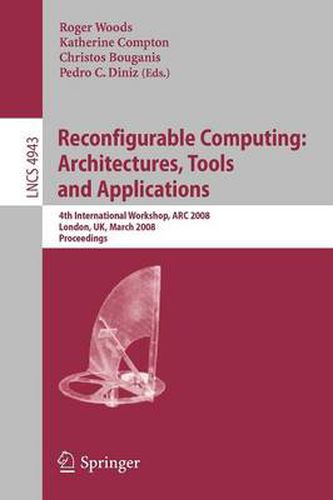Readings Newsletter
Become a Readings Member to make your shopping experience even easier.
Sign in or sign up for free!
You’re not far away from qualifying for FREE standard shipping within Australia
You’ve qualified for FREE standard shipping within Australia
The cart is loading…






This title is printed to order. This book may have been self-published. If so, we cannot guarantee the quality of the content. In the main most books will have gone through the editing process however some may not. We therefore suggest that you be aware of this before ordering this book. If in doubt check either the author or publisher’s details as we are unable to accept any returns unless they are faulty. Please contact us if you have any questions.
For manyyears,the idea of recon?gurablehardwaresystems hasrepresentedthe Holy Grail for computer systemdesigners.It has been recognizedfor a long time that the microprocessor provides high ?exibility but at a very low performance merit in terms of MIPS/W or other such measures. Recon?gurable systems are thus attractive as they can be con?gured to provide the best match for the computational requirements at that speci?c time, giving much better area - speed - power performance. However, the practicalities of achieving such a recon?gurable system are - merous andrequirethe developmentof: suitable recon?gurablehardwareto s- portthe dynamicbehavior;programmingtoolsto allowthe dynamicbehavior of the recon?gurability to be modelled; programming languages to support rec- ?guration;andveri?cationtechniquesthatcandemonstratethatrecon?guration hashappenedcorrectlyateachstage.Whiletheproblemsaremany,theexistence and development of technologies such as the multi-core processor architecture, recon?gurable computing architectures, and application-speci?c processors s- gest there is a strong desire for recon?gurable systems. Moreover, FPGAs also provide the ideal platforms for the development of such platforms. The major motivation behind the International Workshop on Applied - con?gurable Computing (ARC) series is to create a forum for presenting and discussing on-going research e?orts in applied recon?gurable computing. The workshop also focuses on compiler and mapping techniques, and new recon- urablecomputingarchitectures.Theseriesofeditionsstartedin2005inAlgarve, Portugal, followed by the 2006 workshop in Delft, The Netherlands, and last year’s workshop in Mangaratiba, Rio de Janeiro, Brazil. As in previous years, selectedpapershavebeenpublished asa SpringerLNCS(LectureNotes in C- puter Science) volume.
$9.00 standard shipping within Australia
FREE standard shipping within Australia for orders over $100.00
Express & International shipping calculated at checkout
This title is printed to order. This book may have been self-published. If so, we cannot guarantee the quality of the content. In the main most books will have gone through the editing process however some may not. We therefore suggest that you be aware of this before ordering this book. If in doubt check either the author or publisher’s details as we are unable to accept any returns unless they are faulty. Please contact us if you have any questions.
For manyyears,the idea of recon?gurablehardwaresystems hasrepresentedthe Holy Grail for computer systemdesigners.It has been recognizedfor a long time that the microprocessor provides high ?exibility but at a very low performance merit in terms of MIPS/W or other such measures. Recon?gurable systems are thus attractive as they can be con?gured to provide the best match for the computational requirements at that speci?c time, giving much better area - speed - power performance. However, the practicalities of achieving such a recon?gurable system are - merous andrequirethe developmentof: suitable recon?gurablehardwareto s- portthe dynamicbehavior;programmingtoolsto allowthe dynamicbehavior of the recon?gurability to be modelled; programming languages to support rec- ?guration;andveri?cationtechniquesthatcandemonstratethatrecon?guration hashappenedcorrectlyateachstage.Whiletheproblemsaremany,theexistence and development of technologies such as the multi-core processor architecture, recon?gurable computing architectures, and application-speci?c processors s- gest there is a strong desire for recon?gurable systems. Moreover, FPGAs also provide the ideal platforms for the development of such platforms. The major motivation behind the International Workshop on Applied - con?gurable Computing (ARC) series is to create a forum for presenting and discussing on-going research e?orts in applied recon?gurable computing. The workshop also focuses on compiler and mapping techniques, and new recon- urablecomputingarchitectures.Theseriesofeditionsstartedin2005inAlgarve, Portugal, followed by the 2006 workshop in Delft, The Netherlands, and last year’s workshop in Mangaratiba, Rio de Janeiro, Brazil. As in previous years, selectedpapershavebeenpublished asa SpringerLNCS(LectureNotes in C- puter Science) volume.